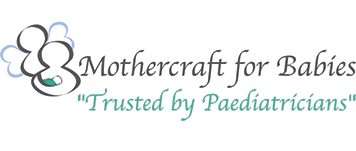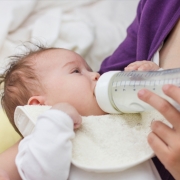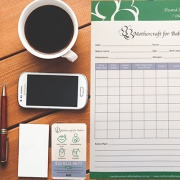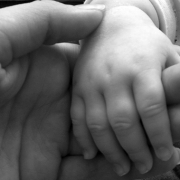Interview by Brooke Hunter – Originally published Femail Magazine
Beth Barclay, a registered Mothercraft nurse with over 20 years of experience supports the long held belief that baby massage has many benefits. It enhances baby and parent bonding through touch and skin to skin contact and helps reduce stress hormones while improving baby’s sleep patterns. To help incorporate massage into baby’s routine Cetaphil has launched its new Baby Massage Oil with shea butter.
‘Massaging baby helps parents to get to know their baby’s sensitivities to touch, what particular parts of their body responds to a soothing touch more than others. It is even known to reduce colic symptoms and improve digestion,” says Beth.
Cetaphil Baby Massage Oil is specially formulated to protect and nourish newborn and infant skin with botanical extracts including natural calendula, shea butter and sunflower seed oil. It also includes Vitamin E to gently moisturise and protect baby’s delicate skin.
Baby massage tips by Beth Barclay:
- Choose a time when you are both calm and baby is alert
- Ensure the room is a comfortable temperature
- Start on the legs as it’s the least sensitive area
- Start with long slow strokes to baby’s arms and legs and use soothing tones in your voice
- Soft music can be played to help relax the parent and baby
- Talking to baby and explaining in simple terms what you are doing will help baby be reassured by your voice
- If baby shows signs of discomfort, then stop and try again another time
- If baby is comfortable on the tummy, then apply long smooth movements from head to toes (great opportunity for tummy time too!)
Interview with Beth Barclay, Mothercraft Nurse
Question: Can you talk us through the benefits of baby massage?
Beth Barclay: There is a long held belief that baby massage has many benefits. It enhances the parent and infant relationship and allow parents get to know their baby’s sensitivities to touch, what particular parts of their body responds to a soothing touch more than others. It can reduce the stress hormones and help relax and settle your baby, improve sleep patterns and sometimes reduce the severity of colic symptoms.
Question: How does baby massage aid in bonding?
Beth Barclay: It helps parent and baby bond through eye contact, verbal soothing and skin to skin contact. And this is the way babies and children experience the feeling of love, through touch. It’s a good ‘wind down” time for both parent and baby, an opportunity to just be with your baby and connect. Some babies may respond quite quickly to the enjoyment of a gentle massage and they are more comfortable with being undressed. Other babies may take some time, so go slowly and patiently, small steps.
It is important to be mindful of your baby’s comfort and willingness to be massaged. If baby is becoming visibly uncomfortable or showing signs of disengagement by losing eye contact and looking away then you should stop. This is a good way for parents to understand their baby’s subtle cues when the enjoyment and relaxation of the experience has finished for them.
Question: What techniques are required for baby massage?
Beth Barclay: Always wash your hands before you start and make sure the room is suitably warm with no draughts so your baby won’t lose any body heat. On a safe surface, rub the massage oil between your palms to warm your hands and you can start with slow smooth strokes to baby’s arms and legs, quietly talking to him and explaining in simple terms what you are doing. Soft music may help relax both of you, particularly if you already use music as a ‘cue” for him to wind down for sleep.
When you decide to introduce massage to your baby choose a time when you are both calm and baby is alert. You may need to leave some clothes on as some babies do not like being undressed. Ensure that the room is a comfortable temperature away from any drafts so that your baby does not lose any body heat. The change table or suitable play mat on the floor maybe practical considerations.
It is important that you are both enjoying this time. If your baby is showing you signs that he is not comfortable then stop and try again another time.
The goal is a relaxed and happy baby and an important bonding time for parent and baby.
Question: How can massage be used to improve sleeping in babies?
Beth Barclay: You may decide to give baby a massage after the evening bath to help prepare and relax your baby for bedtime. This may help with the wind down and calming baby and give a suitable sleep ‘cue” that it is nearly time for bed.
Otherwise it is important that your baby is calm yet alert and feels part of the soothing bonding experience of a massage, having one on one time with the parent or caregiver.
Question: What parts of a baby’s body should we massage?
Beth Barclay: You can start with slow long strokes to his arms and legs, talking to him and explaining in simple terms what you are doing. Baby’s chest and tummy are sensitive areas so be very gentle using circular strokes avoiding the belly button if this has not completely healed.
You can massage their scalps with small gentle circles using your fingertips and similarly the same movements around their forehead and sides of their face. If all is proceeding calmly then roll baby onto their tummy and apply long smooth strokes from head to toes.
Question: Can you talk us through the importance of tummy time?
Beth Barclay: A massage provides a good opportunity to include some practise for tummy time which should be included in baby’s daily routine. Regular tummy time encouraging babies to lift their head helps build their strength in their neck, shoulders and back. This increased muscle strength helps with future milestones such as rolling, sitting up and good head control for starting solids.
Practicing tummy time on a daily basis can also assist and support with torticollis (favouring turning head to one side), (plagiocephaly) ‘flat head” spots. Keeping both sides of their neck strong and flexible can also aid breastfeeding and attachment so baby is just as comfortable feeding on both breasts.










